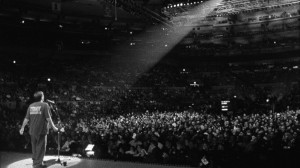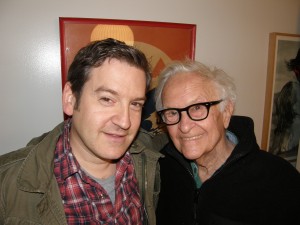
For even the most seasoned journalist, interviewing Albert Maysles is a pretty big deal. I met Al a while back at a NYFVC event on documentary ethics in which he was a panelist. I saw him sitting in the front of the auditorium before the event began and introduced myself. He immediately began to ply me with anecdotes about “Grey Gardens” and “Gimme Shelter”. As he was talking, I realized that I should probably be recording this for my own posterity. So I quickly reached into my pocket and took out my iPhone and hit the voice memo app. Here’s the link to that blog post.
More recently I was invited to a press screening of Al’s latest documentary, co-directed by his creative partner, Maysles Films President Bradley Kaplan. The new documentary, “The Love We Make”, follows Paul McCartney around the streets of NYC a couple of weeks prior to the Concert for New York he organized after the wake of 9/11. I immediately took advantage of the opportunity by pitching an interview with the granddaddy of docs to P.O.V., they happily accepted. That interview appears on this blog and on POV’s. What follows is a transcript of the entire interview.
Schartoff: Well, thanks for coming downtown for this.
Bradley Kaplan: It’s our pleasure to do something with P.O.V. We should do something with P.O.V., shouldn’t we, Al? Other than them airing Salesman a decade ago. Remember that, Al? You got a kick out of that.
Al Maysles: How recent was that?
Kaplan: Well at least 10 or 15 years ago. You tell the story better than I, but I’ll refresh your memory. Years ago, when you made “Salesman” you weren’t able to sell it. No one was buying feature length documentaries at the time. Since your entire ethos has been has been to not have a point of view, you thought it was ironic that the first television airing of it would be on P.O.V.
Schartoff: Speaking of groundbreaking documentaries, I watched that HBO movie “Cinéma Vérité” about the making of “An American Family” last night, the one about the Loud Family. Talk about ethics in documentary filmmaking, that’s what this movie was all about. It depicted filmmaker, Craig Gilbert, as crossing the line ethically speaking. Just to get the story.
Maysles: Crossed the line, how?
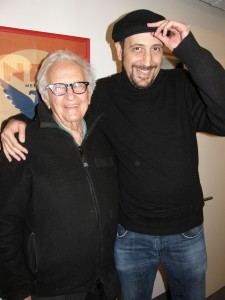
Schartoff: The film purports that he had a relationship with Pat Loud, the mother, that he had some sort of romantic or physical relationship at some point during the making of the film. And that Gilbert had taken advantage of the fragile state of the Loud’s marriage.
Maysles: What did you think of the original?
I was a child when the original documentary had come out and have vivid memories of my parents watching it when it came on. After all these years, I finally had the opportunity to watch it when PBS broadcast it a few months back. I sat and I watched and I was riveted. It was fresh, these 40 years later. And I found that it stayed with me for days afterward. There’s aways that tension between the documentary maker and the subject, how much verite is verite.
Maysles: Something I knew that you didn’t know: Al and Susan Raymond, who shot “An American Family”, they went into the whole thing with a supposition that they must be real flies on the wall. That they shouldn’t have any relationship with the Louds. So, knowing that, I can see how this must have effected them.
Schartoff: Yes, and the movie definitely depicts the difficulty between the Raymonds and Gilbert.
Maysles: The whole idea came from my wife.
Kaplan: This is actually a true story.
Maysles: My wife was working for PBS and Gilbert said to her, “look, we have 13 hours; what should we do with it?” And she said, “what about filming an American family?”
Schartoff: They seemed to have left that out of the record.
Kaplan: Well, she was a young woman working in the early stage of her career. She wasn’t quite an executive at the time, was she?
Maysles: No. She was a young assistant.
Schartoff: Alan and Susan came off, in Cinéma Vérité, as very sympathetic. When things got way too personal and crossed the line, they turned off the camera, to the displeasure of the director.
Kaplan: My parents watched that too and as a kid I was always fascinated that the family was called The Louds. I thought, for sure, it was made up. It was too perfect.
Schartoff: “They’re Loud but what’s their name?” [Laughter]
Kaplan: Right, exactly.
Maysles: They were high volume.
Schartoff: Bradley, can you describe your relationship with Albert and how you came to work together?
Kaplan: Well, I’ve been Albert’s filmmaking partner for over about 6 years. We met through some good people who gave me the courage and impetus to call Albert pretty much out of the blue when I was producing my first feature documentary. And Albert, in ever so gracious and generous manner, and Laura, who at the time was his assistant said, “Oh, you’ve got to come in; that project sounds fascinating. And I’m sure that Albert would love to learn more and meet you.”
Schartoff: This is Laura Coxson?
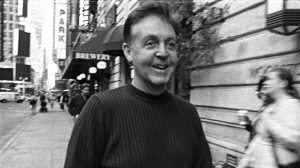 Kaplan: Laura Coxson, who has been a friend ever since, and a producer, partner, colleague and trust ally ever since. So, I went in to meet Albert and we just struck up a friendship, as Albert is very able to do. Because he has such an expansive mind and generous heart. He’s not only generous with his time but with himself. I went there with no objective, no agenda, other than, “Wow, if I’m ever going to take a chance and call The Great Al Maysles out of the blue, it’s going to be now. And sure enough, we just found a number of things from his childhood, from his children’s past experiences and my own, it seemed to be, as Al would say, beyond coincidence. Al is fascinated by coincidence. Al, what is it you often say?
Kaplan: Laura Coxson, who has been a friend ever since, and a producer, partner, colleague and trust ally ever since. So, I went in to meet Albert and we just struck up a friendship, as Albert is very able to do. Because he has such an expansive mind and generous heart. He’s not only generous with his time but with himself. I went there with no objective, no agenda, other than, “Wow, if I’m ever going to take a chance and call The Great Al Maysles out of the blue, it’s going to be now. And sure enough, we just found a number of things from his childhood, from his children’s past experiences and my own, it seemed to be, as Al would say, beyond coincidence. Al is fascinated by coincidence. Al, what is it you often say?
Mayles: ‘Coincidence is God’s way of remaining anonymous.’
Kaplan: It’s a nice quote. So, after meeting for about a half hour at that first meeting, he leans in real close and he says, “so what are we going to do together?” [Laughs] And I said to myself, “I got nothing to pitch!” And Al says, “I got this project and that project and…” I was just blown away. Al has so much energy and passion, I was just blown away. What struck me the most was just how genuine he was and professional. And I could immediately tell from the mood in the office that he was running an organization that was much than about himself.
Maysles: When you realize what you can do with a documentary. You can be there wherever the story is. You have the capacity to capture it and change the world. We are at war at the moment because we didn’t know any better. And we’re not at peace because there’s no one out there telling us what it’s like. Or how to get there, and what it’ll be like. It’s all a matter of making a documentary. To this day I don’t know a single Iraqi family. Not one. Had I seen one documentary about an Iraqi family it would have made a lot more interested in their welfare.
Schartoff: Because a documentary can humanize these people. We do spend a lot of time objectifying the enemy. They’re bad, they don’t have children and they don’t bleed.
Kaplan: Exactly. And that’s what struck me in meeting Albert that first time. I was making a film in Darfur in the middle of a genocide. It was quite humbling. There’s nothing I felt more responsible to than the people with whom I had the opportunity to collaborate with. We always think of our subjects as collaborators. Without them, there is no film. There’s a reciprocity. It’s a dialogue. Albert has always repeats that great Ricky Leacock line…
Maysles: “A fly on the wall is a fly in the ointment.”
Kaplan: You want to be present; you need to be available to people. That’s the whole point. You’re in their lives, literally. So, to deny that is to deny them. So, you need to make the connection. It doesn’t even have to be verbal, often it’s non-verbal. It’s often what the psychologists call the gaze. Being able to look someone in the eye, caring for them, showing that you’re empathic and empathetic,
Maysles: Then they pick up feeling. It allows you to access or not.
Kaplan: It allows them to trust you.
Schartoff: You’re downloading something, in a sense. If you don’t link, it doesn’t work. I went to a screening of Boxing Gym some time ago and heard Frederick Wiseman talk. I was going to say it was his most recent film but it’s not. Since we sat down he’s probably made 2 or 3 more films.
Kaplan: The one about the gym?
Schartoff: Yeah, and Wiseman said he actually wants people to be curious about the camera and feel like that can ask questions and hold it. He wants to get past that. He said the sooner you’re past that, the sooner you can access that comfort level sooner and more successfully.
Kaplan: That reminds me, there’s a great scene in the Maysles Brother’s film when Al and David are traveling by train with The Beatles. They’re heading to D.C. and these 20 year old kids, The Beatles, fresh to America amidst all the Beatlemania, they were interested in the camera. They take the camera and the audio gear, and they’re fascinated by the technology. There was such a genuine intimacy and camaraderie that came from that moment. I have to imagine that it was another way that they were able to find a connection between them. They weren’t just filmmaker and subject, Beatles and Maysles. It wasn’t a heavy scene, it was really entertaining. It brought down the barriers which had a humanizing effect. The camera is really just an extension of Al. He doesn’t use the camera as a tool. As corny as this may sound, it’s genuinely an extension of his heart. Albert is that way without the camera. Al’s way of approaching cinematography is different than others. It’s not only about composition or framing. He’s always looking for that essential intimate thing that is beyond the camera.
Schartoff: That brings up a good point that comes back to your new work, “The Love We Make”. And that is, how do you penetrate a man like Paul McCartney. Someone who is a machine amidst all that fame and celebrity? How do you break through all that and humanize the man?
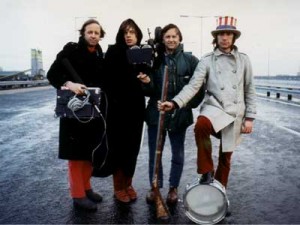
Kaplan: That’s a great question.
Maysles: Well, I had no problem at all because he was the one who wanted the film to be made. He came to me. He described the concert which was coming about two weeks away and said, let’s make a film. Let’s do in it in black and white the way we did the original film.
Schartoff: And you said, “let me get back to you.” [Laughter]
Kaplan: That’s all true but I think there’s more to it. To repeat myself, I think that one of the things that makes Albert so special, as a a person, not just as a filmmaker, is his ability to completely share of himself and to be completely vulnerable. Albert never makes the film a Maysles Film above his subject. Those things are more precious. The film will come. If you allow people to be, celebrities and non-celebrities alike, to really let them in, then they will let you in. I’ve seen Al do it hundreds of times. And as for Paul McCartney. Who can compare… there’s like Paul McCartney and Mohammad Ali. They are probably to the two most famous living people on the planet, I would imagine. If you cross cultural and ethnic lines. And Albert has had access to both of them over a number of decades. That access if probably because their initial experience with Albert was so positive and so rewarding. And they trust him. Without trust, there’s no film, just footage.
Schartoff: At this stage he also has a legacy, a reliable brand with a great track record.
Kaplan: 50 some odd years of making movies.
Schartoff: And is still relevant.
Maysles: The first years of my life were very painful. Years when I couldn’t talk. It’s associated often times with A.D.D. I had to repeat Kindergarten because I never said anything. That’s rare! So I was an early practitioner of listening. Listening and watching. Another thing about A.D.D. is that when it gets intense I can focus much more carefully on what’s going on. So, I’m a very good observer. And patient. And an empathizer. There are several words I like to use in describing what’s special about what I do: “humanize”, “empathize”, and “capture the experience”. That experience may then become the experience of the viewer. You have an intimate connection based on mutual understanding. At the end of the film you know a Hell of a lot more about that person. It’s called direct cinema. What could be more direct than to experience someone else’s experience?
Schartoff: How much of that is also achieved in the editing room?
Maysles: Yeah, that better damn well be good.
Kaplan: I would say a lot. And in all due deference to Albert’s cinematography, without which you don’t have the quality of footage of experience, there’s a team effort. You need a group, people you can rely on and trust to be excellent. The experience happens on camera and off; in front of the camera and behind the scenes. They worked with the editor Charlotte Zwerin for the longest time. In my estimation Charlotte was the singular most great documentary film editor of all time. That’s my humble opinion but I think it’s shared by a number of people. And that’s no disrespect to a number of amazing editors out there working today.
Maysles: The two of my most well known films, “Gimme Shelter” and “Salesman”, were her work.
Kaplan: Yes, and many others. Charlotte went on to make her own films and then, unfortunately, died way too young.
Maysles: From smoking.
Kaplan: Albert’s going to rant and rail now. He’s lost a couple of very close people to smoking. It certainly didn’t help your brother. [Maysles silently nods his head.] But, I think that the process of making a film is so consistently entertaining, demanding, engaging and intense… that Albert recognized very early that his part is making a connection, and being real and present and available as both a cameraman and a human being. And when that experience is captured he absolutely trusts in me and in the case of Ian Markiewicz, our editor/partner/co-filmmaker, to see that into a film. Al is not the kind of filmmaker who sits in the edit bay. He always comes in and sees the editing.
Maysles: I can never make up my mind.
Kaplan: Like all great cinematographers… all the shots are good! They often are, you know?
Maysles: As you’re shooting, you have to make up your mind at that moment.
Kaplan: You’re really good in that moment. And by the way, Ian, I’d like to think myself, and others who work together editorially, are really good in some other moments. Being able to filter those best moments, and to really be able to create something that has meaning beyond the scene of the shot. You were asking earlier, how do you get to Paul now. How we got to Paul is that he had a relationship with Albert, trusts and loves Albert. And vice-versa. The second litmus test moment was with my first meeting with Paul and Al. Paul turns to Al and says, “I trust you and love you, make your film.” Then he turns to me and he says, “and if Al trusts you and loves you, then so do I. Make your film.” Now, I knew he could say that to Albert, he doesn’t owe me anything. The fact that Paul would be that confident and gracious and generous, given where he is in both his personal and professional life… it’s extraordinary. It’s an extraordinary opportunity for a filmmaker and it’s an extraordinary opportunity for him as a human being. I mean, the risks outweigh the potential rewards in my mind.
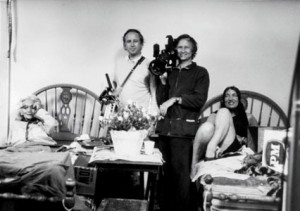
Maysles: Also, we had reached a point where we wanted to show Paul the film, we showed it to him. He didn’t ask me to make any changes.
Kaplan: He knew about the footage that existed from 2001. He had seen some of it. And we shared a bunch of selects with him. Ian and I put together a number of scenes, in no particular hierarchy. And he was like, “This is great. Do you guys think there’s a film there?” And Albert and I said, “Yeah, absolutely. There’s a beautiful film in here. It’s gonna take a while. We’re gonna have to dig in, but yes, there’s a film here.” And he said, “Then go make it.” Then when we did show it to him in its entirety, a complete cut, it was an early cut but it was really strong. We took him to a little screening room here in Manhattan and there was a small group of people there. Very intimate. I purposely didn’t want to sit next to Paul because I would’ve been nervous the whole time [laughs]. Instead, I sat in front of Paul with his long-time attorneys Lee and John Eastman, they’re family. Wonderful folks. So, I’m sitting with Lee a few rows in front and when the lights come up I turn around and I could see Paul was visibly moved. You could see it in his eyes. He stands up and gives Al a big hug, he calls me over and gives me a big hug, and Ian a hug. And he’s like, “Wow, you guys…” And he said something that I usually say to Al about his work. He said, “You left all the edges in.” And I thought, we made our film. Because that’s what makes a Maysles film, a “Maysles film.” It doesn’t just go for the obvious stuff, which everyone is going to do. We also let things linger. We get in a little bit early and stick around a little late. That’s when the special sauce happens.
Maysles: Have you seen “Salesman”?
Schartoff: Yes.
Maysles: The opening scene when the salesman’s having a rough time, trying to convince a woman who has a child on her lap to buy a Bible. Then the child gets up, walks over and starts playing the piano. It’s exactly the mood of “Salesman”.
Schartoff: And I will be looking at it again after this experience.
Kaplan: It’s one of Al’s favorites. A worthy favorite.

